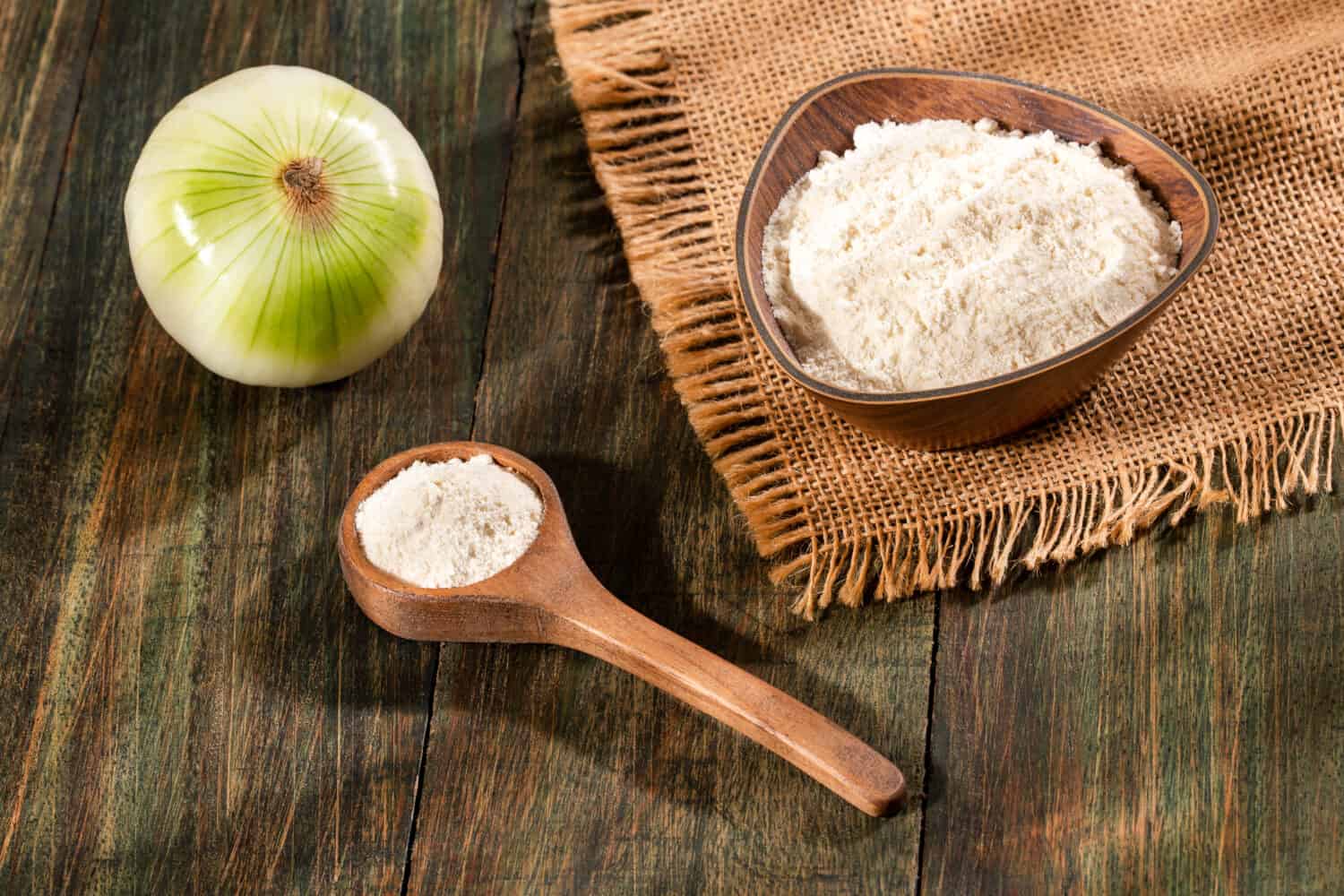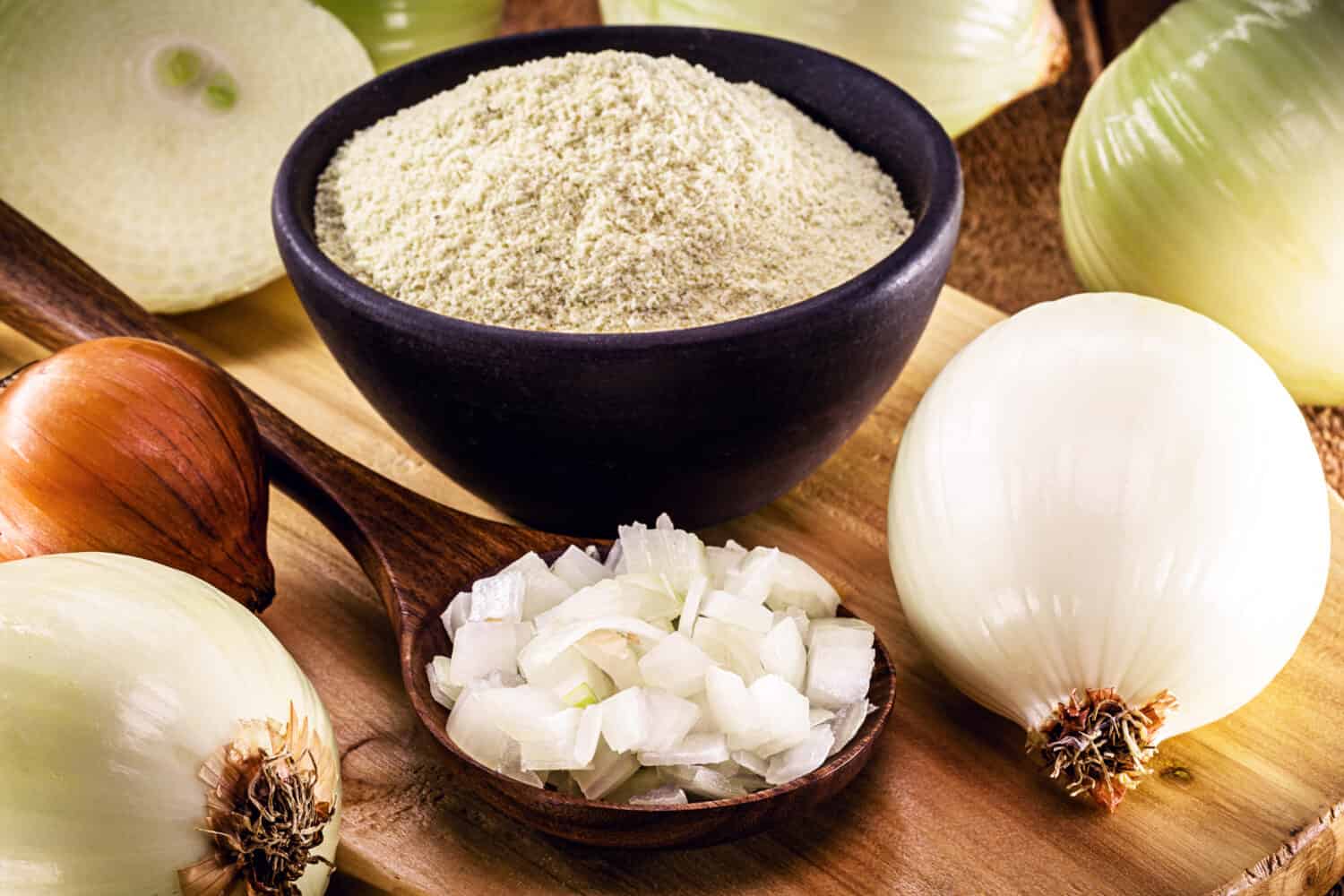You are making a recipe requiring onions and realize you do not have any on hand. However, you have onion powder in the pantry. Can you substitute onion powder for fresh onions? The answer is probably depending on the recipe. We will compare onion vs. onion powder and explore when it is okay to substitute onion powder for onions.
Onion Powder vs. Onion: How is onion powder different from fresh onions?
Eighty-nine percent of a fresh onion is water. Manufacturers dehydrate fresh onions and grind them to make onion powder. Onion powder has a long shelf life because there is no moisture to cause it to go bad. While the powder still tastes like onions, it doesn't have the same sharp smell or taste. Fresh onions spoil within six weeks at room temperature and two months in the refrigerator, so onion powder has a much longer shelf life.

Onion powder lasts up to four years in the pantry; small batch powder is usually purer and tastes better.
©Luis Echeverri Urrea/Shutterstock.com
Onion Powder vs. Onion: Is it a good substitute for onions?
Onion powder may be a good substitute for fresh onions in certain situations, but it will only partially replicate their texture and moisture content. Whether it's a suitable substitute depends on the dish you are preparing. Here are some things to consider when substituting onion powder vs. onions.
- Onion powder has a more intense flavor than fresh onions, so you should use it sparingly to avoid overpowering the dish. One-third of a cup of onion equals one teaspoon of onion powder.
- While fresh onions contain water, onion powder has no moisture. Sometimes, onions will release water while cooking, so you may have to adjust the water in the dish if you use onion powder.
- If the recipe needs the crunch or softness of fresh onions, consider combining onion powder with diced celery or bell peppers to add an onion-like texture to the dish.
Onion powder vs. Onion: What are the best foods for onion powder?
Onion powder is perfect for foods with dense textures, like meatloaf and casserole, because the absence of real onions will not be missed. Additionally, onion powder is a perfect ingredient for making dry rubs for meat. It also can be sprinkled in soup and stews. While it can be added to salads, fresh onions add a crunchy texture, making them a better choice.
Onion Powder vs. Onion: What are the differences between onion powder brands?
The United States produces 10,000 pounds of onion powder yearly, more than any other nation. Onion powder comes in three forms: flakes, granules, or fine powder. Moreover, some manufacturers roast the onion first, which gives the powder a mellow taste. They may also process onion powder with silica or anti-caking agents and include all parts of the onion in the grinding process, which changes the flavor, making it more muddy. Unfortunately, it can be hard to tell which powders are better quality, but small-batch onion powder is generally significantly better than general store brands.
Onion powder vs. Onion: Nutritional differences
There are nutritional differences between a fresh onion and onion powder. According to the USDA, one large, fresh onion contains sixty calories and 134 grams of water. It also has two grams of protein and fiber, six grams of sugar, and contains calcium, iron, and potassium. On the other hand, a one-teaspoon serving of onion powder contains ten calories and one gram of sugar. Because onion powder is dehydrated onion, it has no water.

The United States is the world's largest producer of onion powder.
©Bangkok Click Studio/Shutterstock.com
In Summary
Manufacturers crush and grind dehydrated onions to make onion powder, a convenient spice in most pantries. Onion powder has a four-year shelf life, lasting longer than regular onions. It also has a more intense onion flavor, so a little goes a long way. The rule of thumb for onion powder is to use one teaspoon for every one-third cup of onion. Onion powder is best for texture dense foods like meatloaf and casserole. Use it to make meat rubs or sprinkle it on soup and stews.
If a dish needs texture, you can add crunchy vegetables like diced celery to your recipe and the onion powder to replicate the texture of fresh onions. Additionally, you may have to add water to your recipe because onion powder has no moisture, while fresh onions are eighty-nine percent water. Onion powder is usually a suitable substitute if used sparingly. Moreover, onion powder produced in small batches is generally purer and better tasting than the onion powder made in bulk. In most cases, onion powder is a perfectly good substitute for fresh onions, although you may have to make other adjustments to your dish.
The image featured at the top of this post is ©RHJPhtotos/Shutterstock.com

